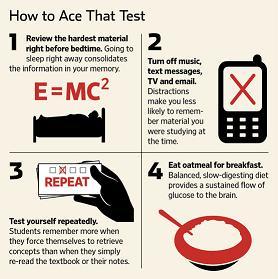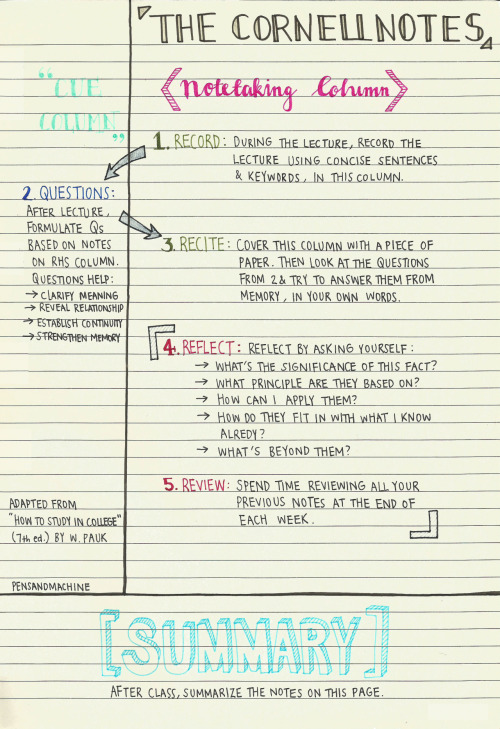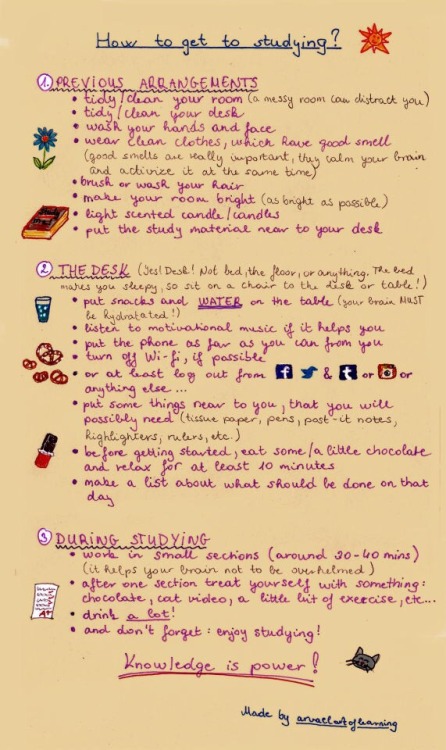#studyingtips
1) Try to get to the day before an exam well prepared. The very last day should be entirely dedicated to read notes again or to repeat out loud what you’ve studied. That also means, DO NOT CRAM a year worthy of notes in few hours.
2) Sleep. Go to bed early and make everything possible to get a quiet, long sleep. (Some studies show that revising notions right before going to bed it’s beneficial to the memory. You can give it a try!)
3) Prepare your bag the night before. Everything you could need during the exam should be already packed: pens, pencils, notes for last minute revising, id card, calculator ecc.
4) Also, prepare your clothes the night before. In my academic career I have had almost only oral examinations and for those, apparence is very important. Many times, the professor doesn’t even know you and all his judgment is based only on the 10-15 minutes of the exam. Dress comfortable but nice. I try always to wear something blue because it calms me down and something I like very much, like a nice pair of earrings or my fave bracelet.
5) Set an alarm. You definitely don’t want to arrive late at school for you final exam. You can also meet with classmates before the test to revise together, it’s helpful for sharing last minute tips or have better knowledge trough comparison. But I also know that for some, revising with other people is very stressful and can cause anxiety, so, it’s perfectly okay yo just sit and wait for your exam to start.
6) Try to stay calm. You’ve studied hard for this. You can do it. You are smart and beautiful.
For more tips follow How To Study Quick!!
1. “I Don’t Know where to Begin.”
Make a list of all the things you have to do. Break your workload down ito manageable chunks. Prioritize. Schedule your time realistically. Begin studying early, with an hour or two per day, and slowly build as the exam approaches.
2. ‘I’ve Got So Much to Study…And so Little Time"
Preview. Survey your syllabus, reading material, and notes. Identify the most important topics emphasized, and areas still not understood. Previewing saves time, by helping you organize and focus in on the main topics.
3. “This Stuff is so Dry, I can’t Even Stay Awake Reading It”
Get actively involved with the text as you read. Ask yourself, “What is important to remember about this section?” Take notes or underline key concepts. Discuss the material with others in your class. Stay on the offensive.
4. “I Read It. I Understand It. But I Just Can’t Get it To Sink In”
Elaborate. We remember best the things that are most meaningful to us. As you are reading, try to elaborate upon new information with your own examples. Try to integrate what you’re studying with what you already know. You will be able to remember new material better if you can link it to something that’s already meaningful to you.
Chunking: Example: to remember the colors in the visible spectrum, Rog G.Biv –> reduce the information the three “chunks”.
Mnemonics: Associate new information with something familiar.
5. “I Guess I Understand It”
Test yourself. Make up questions about key sections in notes or reading. Examine the relationships between concepts and sections. Often, imply by changing section headings you can generate many effective questions.
6. “There’s Too Much to Remember”
Organize. Information is recalled better if it is represented in an organized framework that will make retrieval more systematic.
Write chapter outlines of summaries; emphasize relationships between sections.
Group information into categories or hierarchies, where possible.
Information Mapping. Draw up a matrix to organize and interrelate material.
7. “I Knew It A Minute Ago”
Review. After reading a section, try to recall the information contained in it. Try answering the questions you made up for that section. If you cannot recall enough, re-read portions you had trouble remembering. The more time you spend studying, the more you tend to recall. Even after the point where information can be perfectly recalled, further study makes the material less likely to be forgotten entirely. How you organize and integrate new information is still more important than how much time you spend studying.
For more follow How To Study Quick!!
1. You have bad eyesight.
If your eyesight is not good enough for reading, you might not just realize that immediately. Mostly you will feel bored or unfocused while reading. Trying hard to understand the text and reading the passage over and over again will eventually lead to headaches. Also squeezing your eyes is a sign of bad eyesight.
Let a eye specialist check your eyes and get some reading glasses, you will literally see the difference.
People with reading glasses will agree to be more productive when wearing them.
2. You’re dehydrated.
You drank too much coffee not enough water. Drink enough water to keep your body hydrated. Don’t worry that you’ll have to pee a lot.
3. Your blood pressure is too high or too low.
Sometimes our blood pressure will rise or fall depending on our stress level or even the food we eat. Check your blood pressure regularly and consult your doctor if there is any abnormality. If you feel an uncomfortable change of your blood pressure just lay down on your back and lift your legs up. Lean them on the wall or put them on pillows etc. This will help you to stabilize your blood pressure.
4. Your desk is too dark.
If your desk space is too dark you won’t be able to see well. This will make you sleepy and less focused. Get a lamp on your table and light it up as soon as it gets dark outside.
5. Your room is poorly ventilated.
Having bad air in your room may lead to being unfocused. Simply opening the window and letting fresh air in for a couple of minutes will help.
6. You are dressed uncomfortably.
As silly that may sound, if you are dressed uncomfortably you are most likely to be unfocused. If you are at home you can wear your most comfortable clothes. Nothing is off limits. If you are studying outside, try to dress the way you like the most.
Clothes that are dirty or smelly tend to make us feel bad, so you better change your clothes, that will refresh you.
7. You are stressed.
This is nothing new but very common in a students life. There are plenty ways of getting rid of stress but one of the simplest ways is just to put on a hoodie and go for a walk. Even if it’s just a walk around the block. Moving and getting fresh air help to get rid of the bad thoughts and focus.
8. Your hair is oily.
Another thing that sounds very simple but is very annoying. If your hair is oily your head will feel heavy and this might even lead to headaches. Just jump under the shower and get clean. You will see the difference once you sit at your desk again.
For more tips follow How To Study Quick!!
1. Learn How to Scan
The most important skill you need to develop if you want to read faster is scanning. Many adults find scanning difficult because it feels counter-intuitive. After all, when we were taught to read, we were taught to pay attention to every word in a sentence. However, much of this is unnecessary, because research show that our adult minds have an amazing ability to fill in information gaps.
For example, look at the following piece of text:
‘After this experience she decided that she would never again date menfrom Mediterranean backgrounds, no matter how great they looked or their accents sounded. It simply wasn’t worth the pain.’
By drawing out and focusing on only the highlighted words, I am saving myself the effort of processing every word, and allowing my brain to fill in the missing information.
2. Only Read the First and Last Sentence of Each Paragraph
According to Abby Marks Beale, America’s #1 Speed Reading Expert, people who write to convey information generally follow a fairly tried-and-true formula. That is, to start each paragraph with a topic sentence that introduces the paragraph and gives an idea of where that paragraph is headed. As paragraphs in publications like science and academic journals can contain a lot of information, you’re wasting your time reading all of it if you are already familiar with the topic. Next time you’re faced with a daunting text, try reading the first and last sentence in each paragraph. Chances are you won’t miss much.
3. Turn Off the Voice in Your Head
Another habit we picked up when learning to read in grade school is to sound out words, often from reading aloud. Even as adults, most of us retain this habit to some extent, as over the years, we have become so used to “hearing” the word in our minds. The problem with this is that it takes up unnecessary time, because we can understand a word more quickly than we can say it.
One way to eliminate the voice is to read blocks of words (as mentioned in point 1), as it’s much harder to vocalize sets of words than single words.
Simply eliminating this voice can drastically increase your ability to read faster. However, this techniques does tend to reduce your enjoyment of a well-written text, so you can turn it back on for your favorite crime novelist or poet.
4. Use A Pointer
Often when we read, we tend to ‘regress’, or go over and read the same material again. This is usually due to poor concentration, and results in losing the flow of what your are reading. This is a waste of time, especially when the information you’re re-reading isn’t really necessary. But you can cut down on regression by using a pen as a pointer. Train your eyes to follow the pointer, and this will help you to avoid skipping back.
5. Don’t Multitask While Reading
One of the worst reading habits is reading while watching TV, listening to the radio, or even allowing mental interference to distract you from what you are reading. If you want to read faster, you MUST cut out the distractions and focus solely on the task.
6. Use ‘Soft Eyes’
According to experts, inefficient readers tend to focus on each word, working across each line. This is inefficient because your eye can actually take in about 1.5 inches at a glance, which includes five words. You can also engage your peripheral vision to expand your gaze and take in even more words. You can achieve this by relaxing your facial muscles when reading and allowing your eyes to soften.
7. Ask Yourself Questions About the Text Before You Read
This technique is used by teachers to improve reading comprehension. But it’s also a good way to help you read faster. If you have some idea about what useful information can be taken from the text, make yourself a set of questions and then read quickly to find the answers. This will definitely save you time spent on looking through useless information.
8. Try Speed Reading Software
Many speed-reading techniques can be done manually. However, there is always the temptation to fall back into old habits. If you are serious about learning to read faster, you may want to check out software likeElite Speed Reading , a speed reading training course designed to improve reading speed and comprehension. It uses methods like ‘pointing’, but does it electronically, and is a great way to increase your reading speed.
Living in the information age, we are often bombarded with information we simply don’t have time to process, but if you take these suggestions on board and practice them regularly, you’ll learn to read faster and cut down on the amount of time you waste on information overload in no time.
For more tips follow How To Study Quick!



